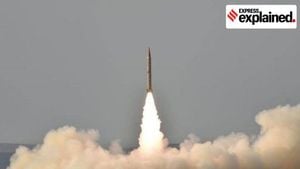The Kingdom of Bahrain is taking significant strides in enhancing its electrical infrastructure with the ongoing construction of the Al-Jasra power transmission project, a crucial initiative by the Electricity and Water Authority (EWA). Recently, Kamal bin Ahmed Mohammed, the Chairman of EWA, conducted an inspection of the project, which boasts a capacity of 400 kilovolts, making it the largest power transmission project currently underway in the country.
According to EWA, the Al-Jasra project is a key component of the broader plan to develop and expand electricity transmission networks across Bahrain. It represents a qualitative leap in the nation's efforts to bolster its energy infrastructure, which is increasingly vital as the demand for electricity continues to grow. The project aims to reduce electrical loads on the main station in the Riffa area by up to 25%, significantly enhancing the reliability and stability of the electrical network and minimizing the risk of outages.
During his visit, Mohammed underscored the importance of the Al-Jasra station in maximizing the use of energy generated from the second Durrat Al Bahrain station. This integration is expected to boost the capacity for electrical load absorption, thereby creating favorable conditions for economic and urban development within the Kingdom.
Furthermore, the project is pivotal in strengthening the electrical interconnection between Bahrain and its Gulf Cooperation Council (GCC) neighbors. By converting the existing 220 kilovolt network to a 400 kilovolt system, it enhances the reliability of the network and supports future energy exchange operations. This upgrade is essential for meeting the anticipated future demand for electricity in Bahrain.
The Al-Jasra 400 kilovolt project is being executed in collaboration with several leading international energy companies, including Siemens from Germany, Hitachi from Japan, and Iljin and Taihan from South Korea, along with China's TBEA. This partnership with global leaders in the energy sector highlights Bahrain's commitment to implementing world-class infrastructure projects.
The project encompasses the construction of a new power transmission station spanning 16,000 square meters, which will add a transfer capacity of approximately 2000 MVA—a remarkable increase of 45%. Additionally, it includes the extension of 130 kilometers of 400 kilovolt ground cables, marking a 92% increase, and the establishment of a 220 kilovolt distribution system via 90 kilometers of 220 kilovolt ground cables, representing a 14% increase.
The new Al-Jasra station is expected to be operational by 2026, which will significantly enhance the electricity transmission network in Bahrain and strengthen the EWA's ability to provide high-quality services to both citizens and residents.
In a related development, Bahraini journalism is also celebrating its evolution and significance in the region. Khaled bin Hamad Al-Malik, the editor-in-chief of the Saudi newspaper Al-Jazirah, recently highlighted the pioneering role of Bahraini journalism during a speech on Bahraini Press Day. He noted that the press in Bahrain has long been a model for upholding freedom of opinion and expression, particularly as the nation marks the 25th anniversary of the Bahraini Journalists Association.
Al-Malik praised the royal initiative by His Majesty King Hamad bin Isa Al Khalifa, which designates May 7 as Bahraini Press Day. He described this initiative as a well-deserved recognition of the contributions made by journalists in Bahrain, emphasizing their role in conveying the voices of citizens and serving the nation.
He expressed hope that Bahraini journalism would continue to develop both technically and humanly, maintaining its established foundations while adapting to the rapid changes in the media landscape. Al-Malik remarked that the establishment of a dedicated day for the press reflects the leadership's appreciation for journalists and underscores the need for objectivity and professionalism in their work.
Moreover, he pointed out that the transition from traditional print media to digital journalism presents both challenges and opportunities for Bahraini journalists. He noted that while many institutions in the Arab region still face difficulties in adapting to this shift, Bahraini journalism has recognized the importance of embracing technology without abandoning its print roots.
Al-Malik emphasized the importance of having a strong association for Bahraini journalists that not only defends their rights but also provides opportunities for training and development. He believes that fostering a supportive environment for journalists is crucial for enhancing the quality and impact of journalism in Bahrain.
As Bahraini journalism continues to evolve, it remains essential for the press to effectively represent the views and concerns of the public, ensuring that it serves as a bridge between citizens and government officials. The celebration of Bahraini Press Day serves as a reminder of the important role that journalism plays in maintaining a healthy democracy.
In conclusion, both the Al-Jasra power transmission project and the recognition of Bahraini journalism highlight the Kingdom's commitment to progress and development across various sectors. As Bahrain invests in its electrical infrastructure and honors its journalists, the nation is poised to continue its trajectory of growth and innovation.



